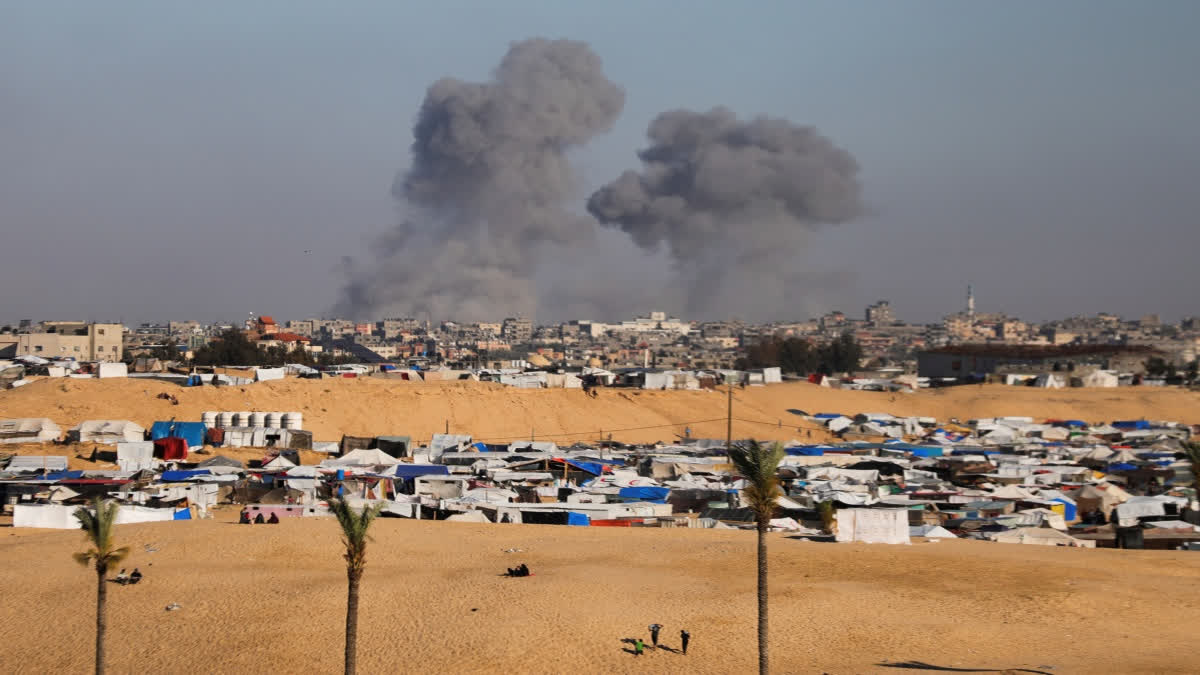Rafah/Tel Aviv:Israel's military says it is launching “targeted strikes” against Hamas in the southern Gaza city of Rafah after the country's War Cabinet approved a military operation there, officials said late Monday.
Hours earlier, the Hamas militant group announced it had accepted a cease-fire proposal brought forward by mediators Egypt and Qatar. A cease-fire could end seven months of war in Gaza — however, it’s uncertain whether a deal will be sealed, as Israel responded by saying the proposal did not meet its “core demands.”
More than a million people are huddled in tents and overcrowded apartments in Rafah after fleeing Israel’s military offensive in other parts of the Gaza Strip. Israel says Rafah is Hamas' last stronghold, but the United States opposes a full-scale invasion of the city bordering Egypt unless Israel provides a “credible” plan for protecting civilians there.
The war in Gaza has driven around 80% of the territory's population of 2.3 million from their homes and caused vast destruction to apartments, hospitals, mosques and schools across several cities. The death toll in Gaza has soared to more than 34,500 people, according to local health officials.
The war began Oct. 7 when Hamas attacked southern Israel, killing around 1,200 people, mostly civilians, and abducting about 250 others. Israel says militants still hold around 100 hostages and the remains of more than 30 others.
Here are the latest developments in this big story:
Israeli Tanks enter Rafah and push close to border crossing
A Palestinian security official and an Egyptian official say Israeli tanks entered the southern Gaza town of Rafah, reaching as close as 200 meters (yards) from its crossing with neighbouring Egypt.
The Egyptian official said the operation appeared to be limited in scope. He and Hamas’ Al-Aqsa TV said Israeli officials informed the Egyptians that the troops would withdraw after completing the operation. The Israeli military declined to comment. On Sunday, Hamas fighters near the Rafah crossing fired mortars into southern Israel, killing four Israeli soldiers.
The Egyptian official, located on the Egyptian side of Rafah, and the Palestinian security official spoke on condition of anonymity because they were not authorized to talk to the press. The Associated Press could not independently verify the scope of the operation.
Earlier Monday, Israel’s War Cabinet decided to push ahead with a military operation in Rafah, after Hamas announced its acceptance of an Egyptian-Qatari proposal for a cease-fire deal. The Israeli military said it was conducting “targeted strikes” against Hamas in Rafah without providing details. The Rafah border crossing is a critical entry point for humanitarian aid into Gaza.
US voices concern to Israel on Rafah operation
The Biden administration officials on Monday continued to express concerns to the Israelis that a major military operation into Rafah’s densely populated areas could be catastrophic.
White House officials on Monday also were privately concerned about the latest strikes on Rafah — although the strikes did not appear to be the widescale attack Israeli Prime Minister Benjamin Netanyahu has been threatening., according to a person familiar with Biden administration thinking who was not authorized to comment publicly.
Hamas publishes full text of cease-fire proposal
Hamas has published a copy of the cease-fire and hostage release proposal that the militant group said it had agreed to on Monday. The framework brought forward by Qatar and Egypt aims to bring a halt to seven months of war in Gaza. However, it's unclear if Israel will agree to the terms.
The proposal outlines a phased release of Israeli hostages held in Gaza alongside the gradual withdrawal of Israeli troops from the entire enclave and ending with a “sustainable calm” or “permanent cessation of military and hostile operations.” Israel has previously said it would not agree to either a full withdrawal of its forces or a permanent cease-fire as part of a hostage release deal.
The first stage would last 42 days and would involve a partial withdrawal of Israeli forces from the Gaza Strip and the release of about 33 hostages held in the territory, including the remaining Israeli women — both civilians and soldiers — as well as children, older adults and people who are ill. Thirty Palestinian prisoners held in Israel would be released in exchange for each Israeli civilian hostage and 50 in exchange for each female soldier.
Palestinians displaced in Gaza would be allowed to return to their home neighbourhoods during that time. The parties would then negotiate the terms of the next stage, under which the remaining civilian men and soldiers would be released, while Israeli forces would withdraw from the rest of Gaza. This phase would be conditioned on achievement of a “sustainable calm.”
The final stage would involve exchange of the bodies of hostages who died in captivity and the beginning of a reconstruction plan for the enclave that would take place over three to five years “under the supervision of a number of countries and organizations, including: Egypt, Qatar and the United Nations.”
Thousands protest in Israel calling for a deal to release hostages
Thousands of Israelis rallied around the country Monday night calling for an immediate deal to release the hostages still held in the Gaza Strip. The protests came as Israel’s War Cabinet voted to begin an operation on the city of Rafah, saying that a cease-fire proposal Hamas accepted earlier in the night was not in line with Israeli demands.
